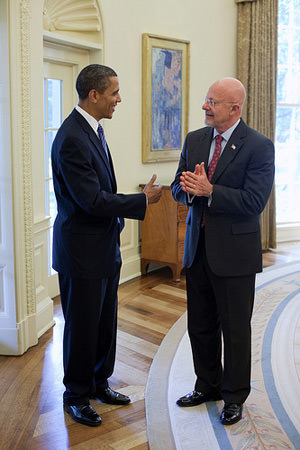Obama’s Intel Nominee Doesn’t Get It
After James Clapper's response to the devastating Washington Post series on the intelligence complex, President Obama should seriously reconsider his nomination to be director of national intelligence.
If I were President Barack Obama, I’d be seriously rethinking James Clapper’s nomination to be director of national intelligence. At the very least, I’d call him in — along with the umpty-ump other intelligence chieftains — and order up another look at the serious problems with the sprawling intelligence bureaucracy exposed by The Washington Post.
This time, not from the posture of a defensive crouch.
The Post team, led by the invaluable Dana Priest, depicted the unwieldy intelligence apparatus that mushroomed in the aftermath of the Sept. 11, 2001, terrorist attacks. “After nine years of unprecedented spending and growth,” Priest and William M. Arkin wrote, “the result is that the system put in place to keep the United States safe is so massive that its effectiveness is impossible to determine.”
No one has — it is hard to see how a single human being could have — a handle on the proliferating activities, with 1,271 government organizations and 1,931 private companies working on counterterrorism, homeland security and intelligence.
As Army Lt. Gen. John R. Vines, who reviewed the Defense Department’s programs last year, told the Post, “I’m not aware of any agency with the authority, responsibility or a process in place to coordinate all these interagency and commercial activities.” The inevitable result, he said, is “message dissonance, reduced effectiveness and waste. We consequently can’t effectively assess whether it is making us more safe.”
Vines was not a lone voice, and his assessment was underscored by specific examples. Unfortunately, the intelligence bureaucracy’s response was predictably self-protective. “The reporting does not reflect the intelligence community we know,” David C. Gompert, acting director of national intelligence, said in a statement.
The agency issued a five-page “fact sheet” on the post-9/11 intelligence community and a two-page myths/realities sheet on contractors. One example: “Myth: The Intelligence Community does not have an accurate picture of its contractor ranks and does not exercise proper oversight over that community. Reality: The IC is a leader in taking a serious, systematic approach to planning and managing its core contract personnel.”
Contrast that with this quote from Defense Secretary Robert Gates: “This is a terrible confession. I can’t get a number on how many contractors work for the Office of the Secretary of Defense.” Gates’ reality, anyway, sounds awfully like the alleged myth.
Most concerning, this defensiveness continued in Clapper’s confirmation hearing Tuesday before the Senate intelligence committee. “I think there was some breathless and shrillness to it that I don’t subscribe to,” he told the panel. “I think she’s [Priest] extrapolated from … her anecdotal experience.” And later, “I think she’s striven for a bit of sensationalism here.”
Unnecessary, overlapping, redundant efforts? “One man’s duplication is another man’s competitive analysis,” Clapper said. True. When you’re dealing with potentially catastrophic failure, you should build in redundancy. But that kind of deliberate overlap is not the situation the Post described. It was more like chaotic — and counterproductive — duplication.
To his credit, Clapper acknowledged some legitimate points — for instance, overlaps in looking at what he called “threat finance” — how terrorists, drug traffickers and others get, and move, their money. “That’s one area I will take to heart,” he said.
Overall, however, his reaction was disappointing. The series was anything but breathless, shrill and sensationalist. It was serious, detailed, fact-based — and deeply disturbing. The senators questioning Clapper seemed to understand this, because they kept coming back to it. That Clapper felt the need to respond with this kind of language does not bode well for his tenure as the fourth director of national intelligence in its five years of existence.
Ruth Marcus’ e-mail address is marcusr(at symbol)washpost.com.
© 2010, Washington Post Writers Group
Your support matters…Independent journalism is under threat and overshadowed by heavily funded mainstream media.
You can help level the playing field. Become a member.
Your tax-deductible contribution keeps us digging beneath the headlines to give you thought-provoking, investigative reporting and analysis that unearths what's really happening- without compromise.
Give today to support our courageous, independent journalists.






You need to be a supporter to comment.
There are currently no responses to this article.
Be the first to respond.